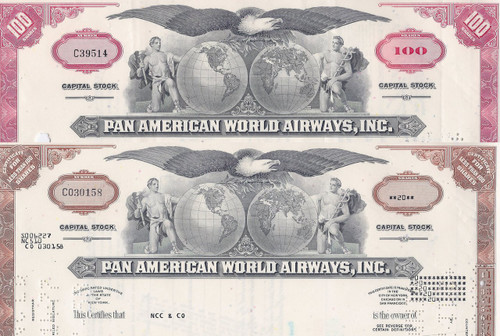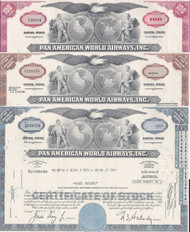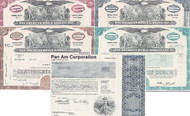Categories
Categories
- Home
- Stock Sets
- Company Sets
- Pan American World Airways Set of 2 Colors
Pan American World Airways Set of 2 Colors
Product Description
Pan American World Airways (Pan Am) stock certificate set of 2 colors - red, brown
Two color set!
Great collectible cert that is affordable, fun, and beautiful. Although common, it is one of our favorite pieces because of the price and history. Stunning vignette of two Greek male figures flanking two hemispheres of the Earth with a large eagle spreading its wings over the scene. Dated from the late 1960's and into the 1970's after Juan Trippe was president.
Please check out our other listing for certificates with Trippe as president or CEO ~ same price as these but not as many color variations.
Pan American World Airways, known from its founding until 1950 as Pan American Airways and commonly known as Pan Am, was the largest international air carrier in the United States from 1927 until its collapse in 1991. Founded in 1927 as a scheduled air mail and passenger service operating between Key West, Florida, and Havana, Cuba, the airline became a major company credited with many innovations that shaped the international airline industry.
Pan American Airways, Incorporated (PAA) was founded as a shell company on March 14, 1927 by Air Corps Majors Henry H. "Hap" Arnold, Carl A. Spaatz, and John H. Jouett Pan American was able to obtain the U.S. mail delivery contract to Cuba. On June 2, 1927 Juan Trippe formed the Aviation Corporation of the Americas (ACA) with the backing of financiers Their operation had the all-important landing rights for Havana, having acquired American International Airways. The Atlantic, Gulf, and Caribbean Airways company was established in 1927 by Richard Hoyt. The company merged with PAA and ACA in 1928. Richard Hoyt was named as president of the new Aviation Corporation of the Americas, but Trippe and his partners held 40% of the equity. During the late 1920s and early 1930s, In September 1929 Trippe toured Latin America with Charles Lindbergh to negotiate landing rights. In 1930, Pan Am purchased the New York, Rio, and Buenos Aires Line. The Aviation Corporation of the Americas changed its name to Pan American Airways Corporation in 1931.
In 1937 Pan Am turned to Britain and France to begin seaplane service between the United States and Europe. Pan Am offered service from Norfolk, Virginia, to Europe via Bermuda and the Azores. In 1934, Trippe decided to start a service from San Francisco to Honolulu and on to Hong Kong and Auckland following steamship routes. Pan Am flew to Singapore for the first time in 1941, starting a semi-monthly service which reduced San Francisco–Singapore travel times. In 1940 Pan Am began using the Boeing 307 Stratoliner, the first pressurized airliner. The Boeing 307's airline service was short-lived, as all were commandeered for military service at the outbreak of World War II.
During World War II most of the Clippers were pressed into military service. Pan Am pioneered a new air route across Western and Central Africa to Iran, and in early 1942 the airline became the first to operate a route circumnavigating the globe. Another first occurred in January 1943, when Franklin D. Roosevelt became the first U.S. president to fly abroad, in the Dixie Clipper. During this period, Star Trek creator Gene Roddenberry was a Clipper pilot; he was aboard the Clipper Eclipse when it crashed in Syria in 1947.
At its peak in the late 1960s and early 1970s, Pan Am advertised under the slogan, the "World's Most Experienced Airline". It carried 6.7 million passengers in 1966, and by 1968, its 150 jets flew to 86 countries. During that period the airline was profitable and its cash reserves totaled $1 billion. Most routes were between New York, Europe, and South America, and between Miami and the Caribbean. In 1964 Pan Am began a helicopter shuttle between New York's John F. Kennedy, LaGuardia and Newark airports and Lower Manhattan.
Since the 1930s, Juan Trippe had coveted domestic routes for Pan Am. Throughout the late 1950s and early 1960s, as well as in the mid-1970s, the airline attempted to merge with American Airlines, Eastern Air Lines and Trans World Airlines. In order to acquire domestic routes, Pan Am, under president Seawell, set its eyes on National Airlines. Pan Am was granted permission to buy National in 1980 in what was described as the "Coup of the Decade." As 1980 progressed and the airline's financial situation worsened, Seawell began selling Pan Am's non-core assets.
In September 1984 Pan American World Airways created a holding company called Pan Am Corporation to assume ownership and control of the airline and the services division.Thomas G. Plaskett, a former American Airlines and Continental executive, replaced Acker as president in 1988. While a program to refurbish Pan Am aircraft and improve the company's on-time performance began showing positive results, on December 21, 1988, the terrorist bombing of Pan Am flight 103 above Lockerbie, Scotland, resulted in 270 fatalities. Pan Am's iconic image had made it a repeated target for terrorists, resulting in many travelers avoiding the airline
The first Gulf War triggered by the Iraqi invasion of Kuwait on August 2, 1990, sent fuel prices skyrocketing, which severely depressed global economic activity. These unforeseen events constituted a further major blow to Pan Am, which was still reeling from the 1988 Lockerbie disaster. Pan Am was forced to declare bankruptcy on January 8, 1991. Delta Air Lines purchased the remaining profitable assets of Pan Am. Pan Am ceased operations on December 4, 1991.
 Loading... Please wait...
Loading... Please wait... 







